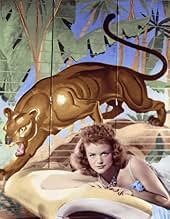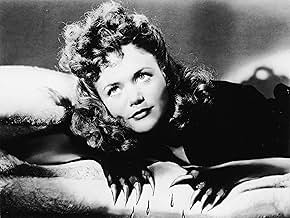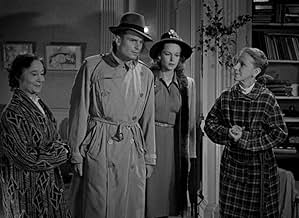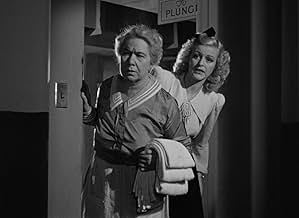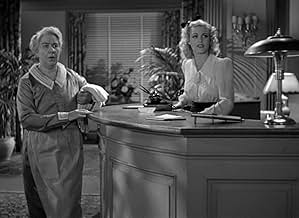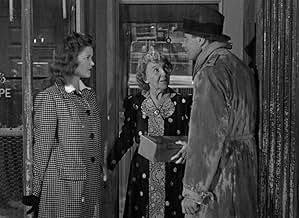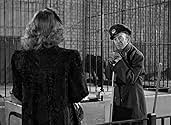IMDb-BEWERTUNG
7,2/10
27.473
IHRE BEWERTUNG
Ein Amerikaner heiratet eine serbische Einwanderin, die befürchtet, dass sie zur Katzenperson der Fabeln ihres Heimatlandes wird, wenn sie eng miteinander verbunden sind.Ein Amerikaner heiratet eine serbische Einwanderin, die befürchtet, dass sie zur Katzenperson der Fabeln ihres Heimatlandes wird, wenn sie eng miteinander verbunden sind.Ein Amerikaner heiratet eine serbische Einwanderin, die befürchtet, dass sie zur Katzenperson der Fabeln ihres Heimatlandes wird, wenn sie eng miteinander verbunden sind.
- Auszeichnungen
- 2 Gewinne & 3 Nominierungen insgesamt
Henrietta Burnside
- Sue Ellen
- (Nicht genannt)
Alec Craig
- Zookeeper
- (Nicht genannt)
Eddie Dew
- Street Policeman
- (Nicht genannt)
Elizabeth Dunne
- Mrs. Plunkett
- (Nicht genannt)
Dynamite
- The Panther
- (Nicht genannt)
Dot Farley
- Mrs. Agnew
- (Nicht genannt)
Mary Halsey
- Blondie
- (Nicht genannt)
Theresa Harris
- Minnie
- (Nicht genannt)
Charles Jordan
- Bus Driver
- (Nicht genannt)
Donald Kerr
- Taxi Driver
- (Nicht genannt)
Connie Leon
- Neighbor Who Called Police
- (Nicht genannt)
Murdock MacQuarrie
- Sheep Caretaker
- (Nicht genannt)
Alan Napier
- Doc Carver
- (Nicht genannt)
Empfohlene Bewertungen
I have this theory about the horror films of Val Lewton. It is my contention that these movies caused a sea change in the content and tone of the movies of Alfred Hitchcock. The reason I say this is simple, really: Lewton is the only filmmaker I have ever caught Hitchcock cribbing scenes from. He did it twice. Once from The Seventh Victim (dir. by Mark Robson), which I swear to god provides the first half of the Shower Scene from Psycho. The second from Cat People, which provided the pet store scene in The Birds. This second scene is almost a shot for shot swipe. Both of these steals are evidence that Hitch knew and admired the Lewton movies. More than that, though, there is a change in the subtext of Hitchcock's thrillers after the Lewton movies. The movies he made before them were cut from the Fritz Lang mold of political thrillers. After the Lewton movies, Hitch's movies became more psychosexual in nature. Vertigo, for instance, could easily fit into Lewton's output.
Cat People is the first of the Lewton movies and sets the tone for them. It pretends to be about a McGuffin (serbian were -panthers), but is actually about something else (in this case, frigidity and repressed lesbianism). This represents a huge change in the evolution of the horror movie. Cat People is the first horror movie to explore these themes as central concerns rather than as sub-rosa undercurrents. It also pioneered the techniques of film noir (which as a genre didn't really exist yet). Cat People is strikingly stylized and its effect is of stranding the viewer in the middle of a darkened room with some dreadful beast circling just outside his sphere of perception. This has a hell of an impact--particularly if you have the good fortune to see this in a theater. I'm not going to claim that Cat People is one of the best horror movies ever made (it does have flaws), but it is one of the four most influential horror movies ever made (along with The Cabinet of Dr. Caligari, Psycho, and Night of the Living Dead). But unlike its brethren, its influence spreads corrosively through the entirety of cinema through both film noir and the films of Alfred Hitchcock. You would be hard pressed to find any film short of Citizen Kane or Rashomon that is nearly as influential.
Cat People is the first of the Lewton movies and sets the tone for them. It pretends to be about a McGuffin (serbian were -panthers), but is actually about something else (in this case, frigidity and repressed lesbianism). This represents a huge change in the evolution of the horror movie. Cat People is the first horror movie to explore these themes as central concerns rather than as sub-rosa undercurrents. It also pioneered the techniques of film noir (which as a genre didn't really exist yet). Cat People is strikingly stylized and its effect is of stranding the viewer in the middle of a darkened room with some dreadful beast circling just outside his sphere of perception. This has a hell of an impact--particularly if you have the good fortune to see this in a theater. I'm not going to claim that Cat People is one of the best horror movies ever made (it does have flaws), but it is one of the four most influential horror movies ever made (along with The Cabinet of Dr. Caligari, Psycho, and Night of the Living Dead). But unlike its brethren, its influence spreads corrosively through the entirety of cinema through both film noir and the films of Alfred Hitchcock. You would be hard pressed to find any film short of Citizen Kane or Rashomon that is nearly as influential.
At the zoo, Oliver Reed (Kent Smith) sees the mysterious Irena Dubrovna (Simone Simon), who is sketching a black panther. He's intrigued by her--it seems to be love at first sight--and is surprised when she invites him into her apartment for a cup of tea. While in her apartment, he sees an odd statue of a man on horseback, holding a sword-skewered cat high in the air. Dubrovna tells him of her native Serbia, and the legend of unchristian "cat people" who were driven into the mountains. Dubrovna's behavior becomes increasingly odd, and animals often react strangely to her. Could she have something to do with the legend of the cat people?
This was director Jacques Tourneur and producer Val Lewton's first horror/thriller film together (they were to do two others together, I Walked With A Zombie (1943) and The Leopard Man (1943)), and for my money, this is the best of the three. Lewton was famous for understated, atmospheric horror that suggested more than it showed, a style that is also evident in his later collaborations with director Robert Wise (who went on to direct the infamous The Haunting (1963), which is often thought to be a pinnacle of this more "suggestive" style, although it's not a particular favorite of mine).
So what does this mean? Well, a lot of younger horror fans, for whom the oldest film that they are really familiar with in the genre is something like The Texas Chainsaw Massacre (1974) or an even more recent film, might be reluctant to call Cat People a horror film. It is "talky", doesn't contain any graphic violence, and we don't even see a horror creature/villain until just a glimpse near the very end of the film. But it is horror--the talking is centered on a captivating supernatural "myth", there are a lot of creepy, well-photographed scenes laden with heavy shadows, there are a couple exquisite chase/suspense scenes, and there is a lot of complex, dark psychological interaction.
The psychological tension is really the focus, as Lewton and Tourneur's films together are moral parables that function more as a metaphor for horror (rather than the more common flipside, where the horror is more prominent and might be a metaphor for some other kind of philosophical point). In this case, the moral and social situations are varied and complex, but are all focused on romantic relationships, ranging from quick actions taken due to lust, to emotional distancing, adultery and abuse of power. The more one watches the film, the more one is likely to get out of the subtextual messages. They remain more subtextual than they might in modern cinema because of content restrictions imposed by studios in this era (although of course those were a reaction to prevalent cultural attitudes at the time). But in retrospect, the buried nature of the themes is a benefit, at least in this case.
Occasionally, the horrific aspect of these types of films can be too understated, so that they simply become realist dramas. That's not the case here. This is a film that is rewarding on many levels.
A 9 out of 10 from me.
This was director Jacques Tourneur and producer Val Lewton's first horror/thriller film together (they were to do two others together, I Walked With A Zombie (1943) and The Leopard Man (1943)), and for my money, this is the best of the three. Lewton was famous for understated, atmospheric horror that suggested more than it showed, a style that is also evident in his later collaborations with director Robert Wise (who went on to direct the infamous The Haunting (1963), which is often thought to be a pinnacle of this more "suggestive" style, although it's not a particular favorite of mine).
So what does this mean? Well, a lot of younger horror fans, for whom the oldest film that they are really familiar with in the genre is something like The Texas Chainsaw Massacre (1974) or an even more recent film, might be reluctant to call Cat People a horror film. It is "talky", doesn't contain any graphic violence, and we don't even see a horror creature/villain until just a glimpse near the very end of the film. But it is horror--the talking is centered on a captivating supernatural "myth", there are a lot of creepy, well-photographed scenes laden with heavy shadows, there are a couple exquisite chase/suspense scenes, and there is a lot of complex, dark psychological interaction.
The psychological tension is really the focus, as Lewton and Tourneur's films together are moral parables that function more as a metaphor for horror (rather than the more common flipside, where the horror is more prominent and might be a metaphor for some other kind of philosophical point). In this case, the moral and social situations are varied and complex, but are all focused on romantic relationships, ranging from quick actions taken due to lust, to emotional distancing, adultery and abuse of power. The more one watches the film, the more one is likely to get out of the subtextual messages. They remain more subtextual than they might in modern cinema because of content restrictions imposed by studios in this era (although of course those were a reaction to prevalent cultural attitudes at the time). But in retrospect, the buried nature of the themes is a benefit, at least in this case.
Occasionally, the horrific aspect of these types of films can be too understated, so that they simply become realist dramas. That's not the case here. This is a film that is rewarding on many levels.
A 9 out of 10 from me.
Cat People is one of the horror genre's most influential films, it's one of the first psychological horrors or at least one of the first to play on the fears of the audience. But Cat People is more than just an influential film, it's also a great one and holds up terrifically well.
It's very well made, with beautiful cinematography and great and effective use of shadows and shadowy lighting. The sets are also hauntingly sumptuous. Cat People has a haunting music score and a very intelligent script that has a good amount of tension as well as a bit of subtle wit. The story, and the atmosphere it has, is one of the main reasons why Cat People works so well, this is more than a monster/ghost feature, this is more a psychological horror that relies on suspense and playing on the audience's fear. Both of which Cat People does splendidly, the suspense in the best parts is positively nerve-shredding and the whole film has a constant eeriness that makes it creepy without resulting to cheap shocks, jump scares or gore. For me the two most effective scenes have always been with the pool and the walk through the park, the latter being justifiably famous and contains a very clever "false shock". It's beautifully directed by Jacques Tourneur, the characters are interesting and the acting is mostly solid if not the best, with Simone Simon being superb. Simon brings a sensuality, menace and poignancy to her role, that makes her presence chillingly mysterious but at times moving. Tom Conway does just fine too.
If there is anything to criticise, Kent Smith is very stiff here. Other than that Cat People is great, both of its genre and as a film in general. 9/10 Bethany Cox
It's very well made, with beautiful cinematography and great and effective use of shadows and shadowy lighting. The sets are also hauntingly sumptuous. Cat People has a haunting music score and a very intelligent script that has a good amount of tension as well as a bit of subtle wit. The story, and the atmosphere it has, is one of the main reasons why Cat People works so well, this is more than a monster/ghost feature, this is more a psychological horror that relies on suspense and playing on the audience's fear. Both of which Cat People does splendidly, the suspense in the best parts is positively nerve-shredding and the whole film has a constant eeriness that makes it creepy without resulting to cheap shocks, jump scares or gore. For me the two most effective scenes have always been with the pool and the walk through the park, the latter being justifiably famous and contains a very clever "false shock". It's beautifully directed by Jacques Tourneur, the characters are interesting and the acting is mostly solid if not the best, with Simone Simon being superb. Simon brings a sensuality, menace and poignancy to her role, that makes her presence chillingly mysterious but at times moving. Tom Conway does just fine too.
If there is anything to criticise, Kent Smith is very stiff here. Other than that Cat People is great, both of its genre and as a film in general. 9/10 Bethany Cox
After several movies made in his native France ,Jacques (Jack) Tourneur makes his first American works in the late thirties."Cat people" is the fifth one;the others are difficult to see and anyway this is this movie that is looked upon as his towering achievement(with the exception of "out of the past") .His female star,Simone Simon,whose English was perfect,enjoyed a career in both countries too:her best part is easily Jean Renoir's "la bête humaine" ,(human beast:it's funny when you know she's playing a woman-animal here).
"Cat people" belongs to the fantasy and horror genre,but it does not really follow its rules.We're close to psychological drama.(Almost) deprived of "special effects" -which is a blessing-Tourneur works with his camera the way a painter does with shadow and light to create strange dreamy atmospheres The pièces de résistance are the scene in the swimming -pool that creates a feeling of terror without using the tricks of the trade,and the scene when Oliver and Alice are in the flat,hearing roaring.
The movie was ahead of its time in several respects:the Freudian allusions would later be developed by Fritz Lang("secret beyond the door",1945) and of course Hitchcock ("Spellbound",same year).You're going to say that these two great directors give their movies a "realistic" treatment and Jack Tourneur does not.Actually,he takes a divergent way:he introduces ambiguity,this ambiguity dear to Roman Polanski .After all,it could be a mere ,so to speak, neurosis.Few of the sequences actually deal with the supernatural :most of the time,it's a couple then a triangle:the "fantastic" elements could be real :the disturbing woman,who calls Irene "my sister",the scenes with the panther at the zoo,and the pool sequence can be explained by Irène's jealousy.
Although,it's only understood ,it's obvious that the marriage Irène/Oliver has not been consummated,because of a not clearly defined reason-how can a man as pragmatist as Oliver believe in such a far-fetched curse?Isn't it the fear of woman,of the original sin?.This topic will be brilliantly taken on by Christian de Challonges "l'alliance" (1970).Note also how Richard Donner aped the pet shops scene for "the omen" (1976).
It seems that Alice's character is an easy way out,and the weak part of the movie because she's essentially here to comfort the audience,to show the way to "straight" life and to secure a happy end.
The remake (1982) destroys all ambiguity,keeps nothing from the original story but the proper nouns ,and fills its quota of nudity and blood.Stick to the Tourneur version.
"Cat people" belongs to the fantasy and horror genre,but it does not really follow its rules.We're close to psychological drama.(Almost) deprived of "special effects" -which is a blessing-Tourneur works with his camera the way a painter does with shadow and light to create strange dreamy atmospheres The pièces de résistance are the scene in the swimming -pool that creates a feeling of terror without using the tricks of the trade,and the scene when Oliver and Alice are in the flat,hearing roaring.
The movie was ahead of its time in several respects:the Freudian allusions would later be developed by Fritz Lang("secret beyond the door",1945) and of course Hitchcock ("Spellbound",same year).You're going to say that these two great directors give their movies a "realistic" treatment and Jack Tourneur does not.Actually,he takes a divergent way:he introduces ambiguity,this ambiguity dear to Roman Polanski .After all,it could be a mere ,so to speak, neurosis.Few of the sequences actually deal with the supernatural :most of the time,it's a couple then a triangle:the "fantastic" elements could be real :the disturbing woman,who calls Irene "my sister",the scenes with the panther at the zoo,and the pool sequence can be explained by Irène's jealousy.
Although,it's only understood ,it's obvious that the marriage Irène/Oliver has not been consummated,because of a not clearly defined reason-how can a man as pragmatist as Oliver believe in such a far-fetched curse?Isn't it the fear of woman,of the original sin?.This topic will be brilliantly taken on by Christian de Challonges "l'alliance" (1970).Note also how Richard Donner aped the pet shops scene for "the omen" (1976).
It seems that Alice's character is an easy way out,and the weak part of the movie because she's essentially here to comfort the audience,to show the way to "straight" life and to secure a happy end.
The remake (1982) destroys all ambiguity,keeps nothing from the original story but the proper nouns ,and fills its quota of nudity and blood.Stick to the Tourneur version.
A man called Oliver Reed falls in love with quirky and timid woman who fears an old curse inside her
An American man (Kent Smith) marries a Serbian immigrant called Irena Dubrovna (Simone Simon) , a shy woman who fears that she will turn into the cat person of her homeland's fables if they are intimate together . Dubrovna believes she carries the Serbian curse of the panther . As strange Irena knew strange, fierce pleasures that no other woman could ever feel . She was marked with the curse of those who slink and and court and kill y night . Oliver then sends Irena for treatment with psychiatrist Dr. Louis Judd (Tom Conway) . Meanwhile , Reed finds consolation with his colleague Alice Moore (Jane Randolph) and then jealousy and envy crop out . Later on , rampages take place through community .
Over-the-top classic picture filled with thrills , intrigue , drama , a loving triangle , some moments of shock and results to be pretty entertaining . Atmospheric goings-on dominate this typically tasteful horror study from director Tourner . Suspense , tension and horror is exposed lurking , menacing , harassing in rooms , stairs , doors and a menagerie . Cinematography by Nicholas Musuraca is magnificent , plenty of lights and dark originating an eerie and creepy scenario . The movie was produced by RKO and its most known and famed producer , Val Lewton , the biggest producer of horror classics (I walked with a Zombie , Leopard man , Bedlam , Ghost ship ), plus he produced for director Mark Robson (in Cat people he works as an editor) numerous films (Isle of the dead , seventh victim) with similar technicians and artists . R.K.O. gave Val Lewton only $150,000 to make the film , resulting in "creative" producing . In fact ; because of the incredibly tight budget, sets from Orson Welles' The Magnificent Amberson were re-used . This forced many of the scenes requiring special effects to be done in shadows which many believe increased the suspense of the film . When studio execs insisted that more footage of the panther be included in the movie, Lewton was able to maintain the budget and the suspense of the film by limiting how many scenes the panther could be visibly seen and told the cinematographer to "keep the panther in the shadows" . Thus the panther called Dynamite appeared in another film by the same producers/directors: 'Leopard man' and was only visible in the office and zoo cage .
RKO usual musician , Roy Webb , creates a fine score with the habitual musical director Bakaleinikoff . Excellent and evocative set design at charge of Albert D'Agostino . The picture was stunningly directed by Jaques Tourneur , being filmed in 18 days . The film was such a hit at the box office, the releases of the next two Lewton films I walked with a Zombie and Leopard man were delayed . Torneur knew the imagination was stronger than anything filmmakers could show visually and played on it with breathtaking results . Addicts to RKO horror should no account miss this movie . The flick will appeal to classic cinema moviegoers . Followed by a sequel titled ¨Curse of the cat people¨ by Robert Wise with similar cast as Simone Simon , Kent Smith and Elizabeth Russell . And an inferior remake (1982) by Paul Schrader with Natassja Kinski , John Heard , Malcolm McDowell , Scott Paulin and Ed Begley
Over-the-top classic picture filled with thrills , intrigue , drama , a loving triangle , some moments of shock and results to be pretty entertaining . Atmospheric goings-on dominate this typically tasteful horror study from director Tourner . Suspense , tension and horror is exposed lurking , menacing , harassing in rooms , stairs , doors and a menagerie . Cinematography by Nicholas Musuraca is magnificent , plenty of lights and dark originating an eerie and creepy scenario . The movie was produced by RKO and its most known and famed producer , Val Lewton , the biggest producer of horror classics (I walked with a Zombie , Leopard man , Bedlam , Ghost ship ), plus he produced for director Mark Robson (in Cat people he works as an editor) numerous films (Isle of the dead , seventh victim) with similar technicians and artists . R.K.O. gave Val Lewton only $150,000 to make the film , resulting in "creative" producing . In fact ; because of the incredibly tight budget, sets from Orson Welles' The Magnificent Amberson were re-used . This forced many of the scenes requiring special effects to be done in shadows which many believe increased the suspense of the film . When studio execs insisted that more footage of the panther be included in the movie, Lewton was able to maintain the budget and the suspense of the film by limiting how many scenes the panther could be visibly seen and told the cinematographer to "keep the panther in the shadows" . Thus the panther called Dynamite appeared in another film by the same producers/directors: 'Leopard man' and was only visible in the office and zoo cage .
RKO usual musician , Roy Webb , creates a fine score with the habitual musical director Bakaleinikoff . Excellent and evocative set design at charge of Albert D'Agostino . The picture was stunningly directed by Jaques Tourneur , being filmed in 18 days . The film was such a hit at the box office, the releases of the next two Lewton films I walked with a Zombie and Leopard man were delayed . Torneur knew the imagination was stronger than anything filmmakers could show visually and played on it with breathtaking results . Addicts to RKO horror should no account miss this movie . The flick will appeal to classic cinema moviegoers . Followed by a sequel titled ¨Curse of the cat people¨ by Robert Wise with similar cast as Simone Simon , Kent Smith and Elizabeth Russell . And an inferior remake (1982) by Paul Schrader with Natassja Kinski , John Heard , Malcolm McDowell , Scott Paulin and Ed Begley
WUSSTEST DU SCHON:
- WissenswertesThe horror movie technique of slowly building tension to a jarring shock which turns out to be something completely harmless and benign became known as a "Lewton bus" after a famous scene in this movie created by producer Val Lewton. The technique is also referred to as a "cat scare," as off-screen noises are often revealed to be a startled harmless cat.
- PatzerWhen Irena does not show up at her apartment when Dr. Judd, Oliver, and Alice are waiting for her, they leave. Dr. Judd hides his cane in the apartment to give him an excuse to borrow Oliver's key and go back in for it. Afterward, he leaves the door unlocked so that he can sneak back in, something that is hidden from Oliver and Alice. Yet, after Oliver and Alice are threatened in the office, they call the apartment to warn Dr. Judd that Irena is definitely dangerous and that he should leave.
- Zitate
Irena Dubrovna: I like the dark. It's friendly.
- Crazy Credits[From the opening credits] "Even as fog continues to lie in the valleys, so does ancient sin cling to the low places, the depression sin the world consciousness." - "The Anatomy of Atavism" - Dr. Louis Judd
- VerbindungenFeatured in Draculeena Presents: Cat People (1960)
Top-Auswahl
Melde dich zum Bewerten an und greife auf die Watchlist für personalisierte Empfehlungen zu.
Details
- Erscheinungsdatum
- Herkunftsland
- Sprachen
- Auch bekannt als
- La marca de la pantera
- Drehorte
- Produktionsfirma
- Weitere beteiligte Unternehmen bei IMDbPro anzeigen
Box Office
- Budget
- 134.000 $ (geschätzt)
- Laufzeit1 Stunde 13 Minuten
- Farbe
- Seitenverhältnis
- 1.37 : 1
Zu dieser Seite beitragen
Bearbeitung vorschlagen oder fehlenden Inhalt hinzufügen




